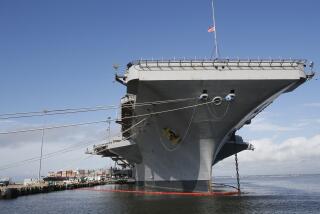Promising Career Goes Down in Flames : Stark’s Skipper, 2 Officers Relieved of Duties
- Share via
WASHINGTON — Barely a month ago, U.S. Navy Capt. Glenn R. Brindel, 43, was the uniformly respected skipper of an award-winning ship, weeks away from completing his second successful command tour at sea.
Then at 9:12 p.m. on May 17, Brindel’s 22-year career was effectively shot down in the Persian Gulf when an Iraqi fighter pilot fired two Exocet missiles into his ship, the guided-missile frigate Stark. The attack killed 37 sailors and wounded 21 others.
On Friday, Brindel, his executive officer and his tactical action officer were relieved of their duties by the chief of naval operations, Adm. Carlisle A.H. Trost, based on their immediate superiors’ “lack of confidence in their performance,” according to a Navy spokesman. In addition, all three officers face the likelihood of a court-martial on charges of negligence, two military sources said.
Fact of Navy LIfe
Brindel’s fate demonstrates an unrelenting and sometimes agonizing fact of Navy life: A momentary lapse of judgment can torpedo even the most promising career. At every moment, a Navy commander is accountable for the operation of his ship and for the conduct of each of his men.
It is a system that shows no mercy. When something goes wrong, the captain must be held responsible.
Several months ago, the Navy told Brindel, who was on the service’s fast track, that he was to report in June to the operational testing and evaluation staff in Norfolk, Va. His replacement on the Stark--Cmdr. John B. Noll--was named, and Brindel’s wife, Donna, moved from the Stark’s home port in Florida to Norfolk.
But that move has been held up pending the results of the Navy investigation into the attack on the Stark. He has been reassigned to the naval surface force in Norfolk.
Earlier this week, Rear Adm. Grant Sharp, who conducted the formal inquiry into the Iraqi attack, recommended that Brindel be court-martialed, according to Pentagon officials. The report was reviewed by Gen. George Crist, head of the U.S. Central Command at McDill Air Force Base, Fla., and on Friday was passed on for review to Defense Secretary Caspar W. Weinberger.
Sympathy for Skipper
Several Navy officials expressed sympathy for Brindel because he was in his stateroom when the first missile hit and had no warning that the Iraqi Mirage F-1 jet posed a threat to the Stark.
“We may have a very unfortunate situation where we may have a very good skipper who was given a sucker punch,” said one top Navy admiral who served as a commanding officer. “He never saw it coming.”
Added another Navy officer in the Pentagon: “I feel sorry for the guy, I really do. He was in the wrong place at the wrong time.”
However, other military officials said that the Navy has no choice but to hold Brindel responsible for his crew’s failure to defend the Stark. By leaving the bridge when he knew that an Iraqi jet had been spotted within 120 miles of the ship, these officials said, Brindel relied on the judgment of his top assistants--Lt. Cmdr. Raymond J. Gajan, the executive officer, and Lt. Basil E. Moncrief, the tactical action officer. Both Gajan and Moncrief, relieved of their duties on the Stark, have been sent to Cruiser Destroyer Group 12 at Mayport Naval Base in Florida.
Brindel said in a prepared statement to congressional investigators probing the incident: “I never had any reason to doubt the ability of the team on watch . . . or their abilities to utilize the ship’s weapons system to defend Stark against attack.”
Failure to Take Critical Steps
But, according to a congressional report released last week, the crew failed to take several critical steps that could have prevented the attack or permitted the ship to shoot down the missiles.
The crew was faulted for waiting too long to send a radio warning to the Iraqi pilot, who apparently mistook the Stark for a ship trading with Iran in the Persian Gulf war zone, and for failing to maneuver the ship into position to use its Phalanx defense system against the missiles.
“I just don’t think that ship was as ready as it should have been, especially considering the area it was operating in,” said one Defense Department official who requested anonymity. “You don’t wait until the jet is 10 to 12 miles away before you issue a warning. . . . You’re always looking out for things like that, always giving warnings, identifying yourself, . . . letting them know you’re tracking them and you’re serious.”
The defense official, along with other Navy officers, said they were not surprised by reports that Brindel could face a court-martial, possibly on negligence charges.
Until the attack, Brindel’s performance and judgment have always been considered exemplary. His military career, which began as a Navy Reserve Officer Training Corps student at Pennsylvania State University in 1965, has been marked by prestigious assignments and numerous awards, including the Meritorious Service Medal, Bronze Star and Vietnamese Cross of Gallantry.
Two Tours in Vietnam
He served two tours in Vietnam and in 1973 was named commanding officer of his first ship, the submarine chaser Chehalis. He also worked as a Naval Academy instructor in special weapons, an executive officer of the destroyer Bigelow and a project manager at the Naval Sea Systems Command before being assigned command of the Stark in June, 1985.
During Brindel’s tenure, the Stark won eight of nine excellence awards in its area, received commendations in fleet exercises and operations and was nominated as the most improved ship at Mayport Naval Base.
Now, the Persian Gulf incident will probably end further promotions for Brindel, Navy officials said.
In his defense, Brindel--who has been assigned a Navy lawyer for the inquiry--said in a two-page statement that he was told by his crew before the attack that an Iraqi aircraft had been spotted approximately 120 miles away from the Stark and posed no threat. He said that was the last status report he was given on the jet.
Paused at His Desk
Brindel said that he left the bridge to go to the bathroom and had paused at his desk in his stateroom when he felt the first missile hit. The skipper said that he rushed to the combat control center but that the second missile hit the ship before he could take any action.
The missiles ignited a fire that trapped many crew members in their bunks and caused massive damage to the ship, which limped to port in Bahrain.
Although the inquiry is continuing, “His Navy career is ended,” one top admiral said. “What more do you need to do to the guy? . . . Is he accountable? Yes. Do we need a court-martial to prove that? Hell, no.
“I think he will live with this for the rest of his life.”
More to Read
Sign up for Essential California
The most important California stories and recommendations in your inbox every morning.
You may occasionally receive promotional content from the Los Angeles Times.













